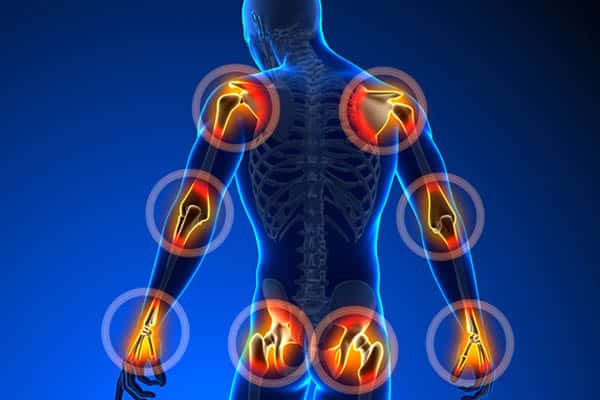Trigger Point Therapy for Pain
Trigger points are tight knots of muscle fibers that can form in muscles or fascia, often causing localized pain, tenderness, and even referred pain to other body areas.
Trigger Point Injections are a regenerative medicine treatment that directly targets these knots to provide immediate relief.
Unlike systemic administration of steroids, trigger point therapy is localized to the area of pain. This may reduce the risk of side effects associated with steroids, such as changes in blood sugar levels, immune suppression, or weight gain.

What Are The Symptoms Of Irritated Trigger Points?
Irritated trigger points can cause localized pain, tenderness, tightness, and restricted range of motion in the affected area.
- Neck and shoulder pain
- Back pain
- Tension headaches
- Tennis elbow
- Carpal tunnel syndrome
- Plantar fasciitis
Why Trigger Point Injections Work So Well
By directly targeting trigger points with local anesthetics and anti-inflammatory agents, TPIs offer:
- Immediate Local Pain Relief: You will experience relief shortly after injection as the tense muscle fibers relax and reduce pain signals.
- Reduction of Inflammation: Some Trigger Point Injections may include a corticosteroid. Corticosteroids have anti-inflammatory properties. This can contribute to both short-term relief and long-term management of pain associated with trigger points.
- Interrupting the Pain Cycle: Trigger points often contribute to a cycle of pain, muscle tension, and restricted movement. TPI helps break this cycle by releasing the tension in the affected muscles. This interruption of the pain cycle provides immediate relief and can improve overall muscle function and reduce pain over time.
What Happens During A Trigger-Point Injection Procedure?
- During the procedure, your specialist will locate and mark the trigger point on your skin, stabilize the tissue by pinching it, and insert a small needle into the trigger point.
- This rhythmic needling may cause muscle spasms or twitches, which the Specialist will address by moving the muscle in various directions until it relaxes.
- Finally, a local anesthetic, possibly with a corticosteroid, will be injected by your Specialist.
- You can go right home once the procedure is over. But you should avoid strenuous activities for the first few days.
How Long Does The Pain Relief Last?
Most people feel pain relief between 24 and 72 hrs after the injection procedure. Pain relief usually lasts about a month. If you still feel pain after this period, we may recommend additional injections for long-term relief.
Who Should Have a Trigger-Point Injection?
If you have tried other treatments such as over-the-counter pain medications, heat therapy and massage therapy or myofascial releases, but your pain has not improved, a trigger point injection could be the right choice for you.
Injections of trigger points are often used in conjunction with physical rehabilitation and stretching exercises by providers to relieve pain.
This strategy is particularly useful when a trigger-point injection is used to reduce pain for people who cannot do physical rehabilitation or stretch due to intense pain. The trigger point injection allows physical rehabilitation to be more efficient.
Before we can prescribe a trigger-point injection, we will need to perform a physical exam and rule out other possible causes of pain, including:
- Muscle strain
- Pain caused by structural issues.
- Back pain can be caused by spinal issues such as degenerative arthritis or a herniated disc.
- Radiculopathy
Covington Trigger Point Therapy
Dr. Curtis and Dr. Strahl lead our experienced Covington Trigger Point Injections team.



Hammond Trigger Point Therapy
Dr. Siecsnyadre and Dr. Dericks lead our team providing Trigger Point Injections in Hammond.



